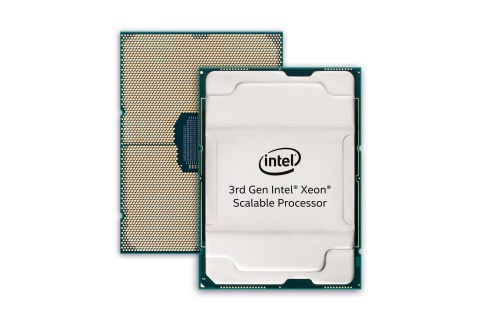Intel reveals 3rd-gen 'Cooper Lake' Xeon Scalable processors
Chipmaker shows continued interest in AI workloads with bfloat16-based CPU


Intel has introduced the third-generation of its Xeon scalable processor, a range of chips designed for data centres and artificial intelligence workloads.
It's the industry's first mainstream server processor with built-in bfloat16 (brain floating point) support, according to Intel. The built-in bfloat16 is a compact numeric format which boosts the AI performance of its CPU, which makes AI inference and training more widely deployable on general-purpose CPUs.
It follows on from the 2nd-gen Xeon Scalable Processor, which was announced in February, designed to take on AMD's Epyc Rome family of data centre chips which focus on the 5G market.
The 3rd-gen, however, focuses on AI-based applications such as image classification, recommendation engines, speech recognition and language modelling.
By 2021, 75% of commercial enterprise apps will use AI, according to IDC. Along with analytics, its opening opportunities across a broad range of industries, including finance, healthcare, industrial, telecom and transportation.
"The ability to rapidly deploy AI and data analytics is essential for today's businesses," said Lisa Spelman, Intel's corporate VP and GM of Xeon and Memory Group.
"We remain committed to enhancing built-in AI acceleration and software optimisations within the processor that powers the world's data centre and edge solutions, as well as delivering an unmatched silicon foundation to unleash insight from data."
Sign up today and you will receive a free copy of our Future Focus 2025 report - the leading guidance on AI, cybersecurity and other IT challenges as per 700+ senior executives
The 3rd Gen Xeon Scalable processor, which were codenamed 'Cooper Lake", is designed for deep learning, virtual machine density, in-memory database, mission-critical applications and analytics-intensive workloads.
In addition to the Xeon processor, which is available from today, the chipmaker is also launching Intel Optane persistent memory 200 series, with general OEM systems expected to be available later in the year. The Intel Optane persistent memory 200 series can provide up to 4.5 terabits of memory per socket to manage data-intensive workloads, according to Intel.
Bobby Hellard is ITPro's Reviews Editor and has worked on CloudPro and ChannelPro since 2018. In his time at ITPro, Bobby has covered stories for all the major technology companies, such as Apple, Microsoft, Amazon and Facebook, and regularly attends industry-leading events such as AWS Re:Invent and Google Cloud Next.
Bobby mainly covers hardware reviews, but you will also recognize him as the face of many of our video reviews of laptops and smartphones.
-
 Trump's AI executive order could leave US in a 'regulatory vacuum'
Trump's AI executive order could leave US in a 'regulatory vacuum'News Citing a "patchwork of 50 different regulatory regimes" and "ideological bias", President Trump wants rules to be set at a federal level
-
 TPUs: Google's home advantage
TPUs: Google's home advantageITPro Podcast How does TPU v7 stack up against Nvidia's latest chips – and can Google scale AI using only its own supply?
